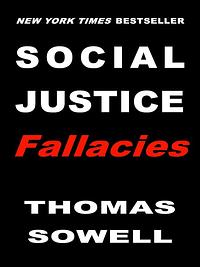You need to sign in or sign up before continuing.
Take a photo of a barcode or cover
challenging
informative
medium-paced
Much like Sowell's voluminous other works, this one is straightforward and insightful. My only complaint is that he cites himself multiple times in his bibliography. Otherwise, this is a quick read that breaks down the circular arguments of today's "social justice warriors" and offers valuable insight into how the social justice agenda has actually resulted in worse outcomes for the groups they claim to help.
informative
fast-paced
Book Review
Social Justice Fallacies
Thomas Sowell
5/5 stars
"Riffing on lots of older ideas."
*******
Thelonious Monk recorded the same songs over and over again over the course of decades, and he justified it saying that "I did it so that people will hear 'em."
And, in that sense, repetition of helpful ideas and debunking of misconceptions to the masses is a lot more helpful than the development of original ideas. (Sowell is a popularizer, and not primrily an original researcher.)
As entrenched as a lot of these misconceptions are, books like this need to be rewritten another thousand times.
Reading this book in particular reminds me of listening to a remastered cover of a favorite song.
1. Good, but predictable;
2. A few surprises;
3. Sharpening of other aspects in the remaster that may not have been in the original.
Of the book:
1. Readable from beginning to end in a few hours;
2. 130 pages over five chapters;
3. 536 point citations over 130 pages. 4.12 per page (really, it's more like 1200 sources, because some of the point citations have as many as 5 sources);
4. Sowell cites himself 36 times.
Interesting factoids:
1. John Maynard Keynes was actually a hardcore eugenicist and was a founder of the Eugenics society at Cambridge University.
2. Even though it has gone down the memory hole, genetic determinism and Eugenics was popular with the progressive / left-wing people a century ago. (Part of the benefit of an author who sources so heavily is that the paper trail is there.)
3. "The innocent sounding word 'arrange' cannot be allowed to obscure these dangers. Interior decorators arrange. Governments compel. It is not a subtle distinction."
4. "In his book, 'The New Freedom,' Woodrow Wilson arbitrarily defined government benefits as a new form of freedom, thereby verbally finessing a side concerns about expanding powers of government being a threat to people's freedom."
5. "There are more hockey players from Sweden in the NHL than there are hockey players from California, even though the population of California is nearly four times the population of Sweden."
6. Concepts fleshed out:
a. Reciprocal inequalities
b. Surrogate decision makers
c. Preempting decisions
7. White, female headed single parent families have had a poverty rate more than double the poverty rate of black married couple families in every year from 1994 to 2020.
8. "People are not hired or paid for their innate potentialities. They are hired, paid, admitted to colleges or accepted into other desired positions on the basis of their developed capabilities relevant to the particular endeavor.
9. "Madison Grant, whose book Hitler called "
'his Bible,' was likewise a staunch progressive of the early 20th century.... He was from a wealthy family in New York, and he was educated at Yale and the Columbia University Law School."
Second order thoughts:
Sowell has written so many good things that he could reasonably expected to spend much of his career sharpening and restating things that he developed in the first half. (To continue the musical metaphor: Billy Joel has not put out a new album in 30 years, but he still can sell out Madison Square Garden by replaying and riffing on his existing repertoire.)
Even Sowell's best book, "Knowledge and Decisions" was an exposition of already existing research.
The whole book reads like a broadside, but in reality it serves better as a reference book to study other topics more deeply.
It has elements from the following books of his that I've already read (and that he self-cites):
1. Knowledge and Decisions
2. Discrimination and Disparities
3. Race and Culture
4. Quest for Cosmic Justice
5. Affirmative Action....
6. Intellectuals and Society
7. Wealth, Poverty and Politics
8. Economic Facts and Fallacies
9. Charter Schools and Their Enemies
10. Housing Boom and Bust
11. Trickle Down Theory
12. Basic Economics
13. Race and Economics
14. Black Education, Myths and Tragedies
15. Man of Letters
16. A Personal Odyssey
17. Inside American Education
In addition, there are books But dozens of other authors that are worth reading in their own right.
Verdict:
Recommended. Wait until it gets down to about $10.
Social Justice Fallacies
Thomas Sowell
5/5 stars
"Riffing on lots of older ideas."
*******
Thelonious Monk recorded the same songs over and over again over the course of decades, and he justified it saying that "I did it so that people will hear 'em."
And, in that sense, repetition of helpful ideas and debunking of misconceptions to the masses is a lot more helpful than the development of original ideas. (Sowell is a popularizer, and not primrily an original researcher.)
As entrenched as a lot of these misconceptions are, books like this need to be rewritten another thousand times.
Reading this book in particular reminds me of listening to a remastered cover of a favorite song.
1. Good, but predictable;
2. A few surprises;
3. Sharpening of other aspects in the remaster that may not have been in the original.
Of the book:
1. Readable from beginning to end in a few hours;
2. 130 pages over five chapters;
3. 536 point citations over 130 pages. 4.12 per page (really, it's more like 1200 sources, because some of the point citations have as many as 5 sources);
4. Sowell cites himself 36 times.
Interesting factoids:
1. John Maynard Keynes was actually a hardcore eugenicist and was a founder of the Eugenics society at Cambridge University.
2. Even though it has gone down the memory hole, genetic determinism and Eugenics was popular with the progressive / left-wing people a century ago. (Part of the benefit of an author who sources so heavily is that the paper trail is there.)
3. "The innocent sounding word 'arrange' cannot be allowed to obscure these dangers. Interior decorators arrange. Governments compel. It is not a subtle distinction."
4. "In his book, 'The New Freedom,' Woodrow Wilson arbitrarily defined government benefits as a new form of freedom, thereby verbally finessing a side concerns about expanding powers of government being a threat to people's freedom."
5. "There are more hockey players from Sweden in the NHL than there are hockey players from California, even though the population of California is nearly four times the population of Sweden."
6. Concepts fleshed out:
a. Reciprocal inequalities
b. Surrogate decision makers
c. Preempting decisions
7. White, female headed single parent families have had a poverty rate more than double the poverty rate of black married couple families in every year from 1994 to 2020.
8. "People are not hired or paid for their innate potentialities. They are hired, paid, admitted to colleges or accepted into other desired positions on the basis of their developed capabilities relevant to the particular endeavor.
9. "Madison Grant, whose book Hitler called "
'his Bible,' was likewise a staunch progressive of the early 20th century.... He was from a wealthy family in New York, and he was educated at Yale and the Columbia University Law School."
Second order thoughts:
Sowell has written so many good things that he could reasonably expected to spend much of his career sharpening and restating things that he developed in the first half. (To continue the musical metaphor: Billy Joel has not put out a new album in 30 years, but he still can sell out Madison Square Garden by replaying and riffing on his existing repertoire.)
Even Sowell's best book, "Knowledge and Decisions" was an exposition of already existing research.
The whole book reads like a broadside, but in reality it serves better as a reference book to study other topics more deeply.
It has elements from the following books of his that I've already read (and that he self-cites):
1. Knowledge and Decisions
2. Discrimination and Disparities
3. Race and Culture
4. Quest for Cosmic Justice
5. Affirmative Action....
6. Intellectuals and Society
7. Wealth, Poverty and Politics
8. Economic Facts and Fallacies
9. Charter Schools and Their Enemies
10. Housing Boom and Bust
11. Trickle Down Theory
12. Basic Economics
13. Race and Economics
14. Black Education, Myths and Tragedies
15. Man of Letters
16. A Personal Odyssey
17. Inside American Education
In addition, there are books But dozens of other authors that are worth reading in their own right.
Verdict:
Recommended. Wait until it gets down to about $10.
Thought-provoking and a sobering reminder that our ideals do not inherently lead to paradise.
informative
fast-paced
I expected some similarities between Thomas Sowell's Social Justice Fallacies and his previous book, Economic Facts and Fallacies, but I still found myself surprised by just how much similarity there was. Some chapters (the one on the Chess Piece Fallacy, for instance) looked like the same talking points had been lifted wholesale and rewritten. There's a different slant to the presentation, of course - this book focuses on the difficulties that come from regulating outcomes across broad groups, leading to unintended consequences. But it's largely the same points underneath - different racial/cultural/ethnic/gender groups have different outcomes because they have different priorities leading to different choices, and Sowell argues that systematic discrimination is a minor factor in outcomes. The various data that Sowell presents is fine, as far as I can tell as a layman, but his conclusions tend to go only one step - it's bad to have government step in to address discrimination when the real causes of poverty and inequality are cultural and economic - and then stop, not asking the logical next question of how we as a society should apply ourselves to addressing those other causes. I do think he points out some good areas where government policies have had bad effects, and that's good information, but not going into what should happen instead left me feeling as that the discussion wasn't finished.
informative
fast-paced
"The seemingly invincible fallacy that only human bias can explain different economic and social outcomes among peoples is belied repeatedly by hard facts in societies around the world." (16)
I can already tell that this is the wrong place to start with Sowell: I know for a fact that the man's too smart to tilt at that windmill. Social Justice Fallacies, unfortunately, produces 130 pages of basically that. Unfortunately, the endnotes padding this thing out do not contain a citation for the above. I don't scan exhaustively, already seething that this is the point of view I have to keep in mind as opponent. To be clear, "only human bias" is a silly framing and if it's your explanation you should go sit down for a while before you absorb anything Thomas Sowell has to say.
There are a few fairly egregious tidbits. "Median ... family income" and "median per capita income" ratios blithely compared in adjacent paragraphs on 23. The singular note (n.50 on p. 150) to a section describing Progressivism's alleged about-face on genetic determinism (genetic inferiority to racism as sole cause) lists only Progressive descriptions of their critics. "Later Progressivism" lacks any documented contemporary explanations of social phenomena and is by the numbers a brag about predicting the '08 crash based on banks being forced to be woke. "Exploitation" is never actually engaged with seriously on Marx's terms, merely attached to his name to tar the idea.
"If black family poverty is caused by 'systemic racism,' do racists make an exception for blacks who are married? Do racists either know or care whether blacks are married?" (24) There may be accounts of systemic racism which address, say, incarceration and its relationship to marriage. But that doesn't fit the rhetorical mode (of reaction, the simplified three-part model is impossible to escape): Use a lefty phrase, reduce the counter-narrative to individual actors, make the liberal sound silly. A bundle of notes implying the consensus of eminent economists is useful but not required.
Where the book really lost me, though, was the description of Woodrow Wilson's redefinition of freedom as "arbitrary" (37). I was unfamiliar with The New Freedom, but the seven references to it are easy enough to pull up public-domain style. In them, one clear reference is to anti-monopoly. Far from arbitrary, I think, and certainly traditional, American; A strange way to attack. I lost my taste for closer reading.
That's at least a little sad, as Sowell's desire for limiting power and exhortation to read widely and listen carefully is certain to be ignored. The red meat is simply too tempting. Omnicompetence, myopia about "income" inequality, and instinctive defense of public-schooling-as-it-exists are legitimately weak positions. But they have other alternatives than free market charter school absolutism. Conservatism has its just-so stories; The citation weight is hilariously on that side in this book; It feels like a quick greatest hits collection with engaging language for the 2020s. Hairline cracks, too, especially comparing ideas in some of the chapters. And what if we apply fact-based, maybe even material analysis, to 20th-century Chinese politics or the exception to the rule of immigrants forming mirrors-to-home communities on the American continent?
I'm grateful for the pointer - finally - to the half-of-Americans-reach-top-income-quintile paper.
I can already tell that this is the wrong place to start with Sowell: I know for a fact that the man's too smart to tilt at that windmill. Social Justice Fallacies, unfortunately, produces 130 pages of basically that. Unfortunately, the endnotes padding this thing out do not contain a citation for the above. I don't scan exhaustively, already seething that this is the point of view I have to keep in mind as opponent. To be clear, "only human bias" is a silly framing and if it's your explanation you should go sit down for a while before you absorb anything Thomas Sowell has to say.
There are a few fairly egregious tidbits. "Median ... family income" and "median per capita income" ratios blithely compared in adjacent paragraphs on 23. The singular note (n.50 on p. 150) to a section describing Progressivism's alleged about-face on genetic determinism (genetic inferiority to racism as sole cause) lists only Progressive descriptions of their critics. "Later Progressivism" lacks any documented contemporary explanations of social phenomena and is by the numbers a brag about predicting the '08 crash based on banks being forced to be woke. "Exploitation" is never actually engaged with seriously on Marx's terms, merely attached to his name to tar the idea.
"If black family poverty is caused by 'systemic racism,' do racists make an exception for blacks who are married? Do racists either know or care whether blacks are married?" (24) There may be accounts of systemic racism which address, say, incarceration and its relationship to marriage. But that doesn't fit the rhetorical mode (of reaction, the simplified three-part model is impossible to escape): Use a lefty phrase, reduce the counter-narrative to individual actors, make the liberal sound silly. A bundle of notes implying the consensus of eminent economists is useful but not required.
Where the book really lost me, though, was the description of Woodrow Wilson's redefinition of freedom as "arbitrary" (37). I was unfamiliar with The New Freedom, but the seven references to it are easy enough to pull up public-domain style. In them, one clear reference is to anti-monopoly. Far from arbitrary, I think, and certainly traditional, American; A strange way to attack. I lost my taste for closer reading.
That's at least a little sad, as Sowell's desire for limiting power and exhortation to read widely and listen carefully is certain to be ignored. The red meat is simply too tempting. Omnicompetence, myopia about "income" inequality, and instinctive defense of public-schooling-as-it-exists are legitimately weak positions. But they have other alternatives than free market charter school absolutism. Conservatism has its just-so stories; The citation weight is hilariously on that side in this book; It feels like a quick greatest hits collection with engaging language for the 2020s. Hairline cracks, too, especially comparing ideas in some of the chapters. And what if we apply fact-based, maybe even material analysis, to 20th-century Chinese politics or the exception to the rule of immigrants forming mirrors-to-home communities on the American continent?
I'm grateful for the pointer - finally - to the half-of-Americans-reach-top-income-quintile paper.
informative
medium-paced
Horrible book. Negative attitude rationalizing support to oppose social Justice efforts. I quit our book club based on this garbage read. Too many good books to read.
challenging
informative
inspiring
reflective
medium-paced
This book covers in quite some detail the agenda of social justice (warriors). They don't care about you, they just want to feel good about themselves
Wake up
informative
medium-paced



